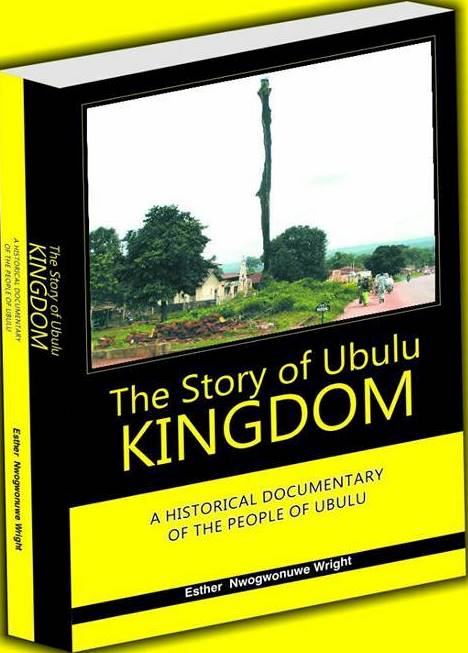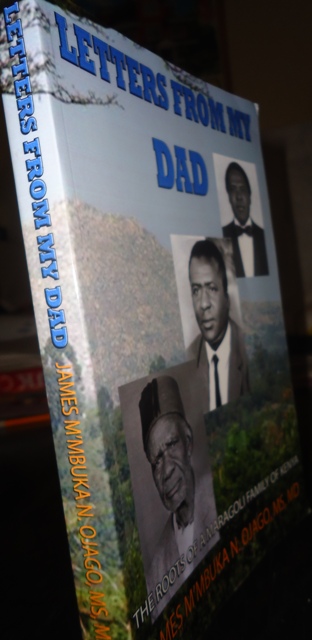By Fred Mbogo
Published September 10, 2013
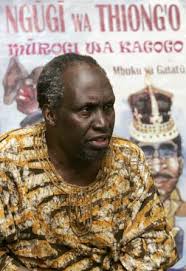 The winner of the Nobel Prize for Literature shall be revealed in October 2013 by the Swedish Academy. Speculation abounds as to who could win the coveted prize. Nigeria’s Chinua Achebe missed the Nobel. Tanzania’s Euphrase Kezilahabi and Said Ahmed Mohammed haven’t bagged it. Perhaps it is Somalia’s Nurrudin Farah’s moment; or maybe Senegal’s Sembene Ousmane’s?
The winner of the Nobel Prize for Literature shall be revealed in October 2013 by the Swedish Academy. Speculation abounds as to who could win the coveted prize. Nigeria’s Chinua Achebe missed the Nobel. Tanzania’s Euphrase Kezilahabi and Said Ahmed Mohammed haven’t bagged it. Perhaps it is Somalia’s Nurrudin Farah’s moment; or maybe Senegal’s Sembene Ousmane’s?
Many are putting their money on Kenya’s best known writer and academic, Ngugi wa Thiong’o. But does it matter if Prof Ngugi wa Thiong’o wins this most coveted literary prize? There surely must be a way of determining the most deserving candidate from the pool that has been nominated? Well, this is precisely the problem; is the award based on any scrutiny of a writer’s aesthetic sensibilities or the cache of issues in their work?
Ngugi wa Thiong’o manages to twin his aesthetics with his politics. He can be said to have politicised his art or beautified his politics. By rejecting that which is given to him through a colonial distortion of his people’s perceived truths, Ngugi wa Thiong’o authoritatively stamps his writer’s ‘voice’. He goes back to his roots to stake a claim on what he must imagine is his due. His drama and fiction bear titles of protest such as I Will Marry When I Want, Devil on the Cross, Mother Sing for Me, Petals of Blood, and the like. His thinking is best expressed in one of the titles of his books of essays: Decolonizing the Mind. He has become Ngugi wa Thiong’o by rejecting ‘James Ngugi’, a name he feels misrepresents his African identity.
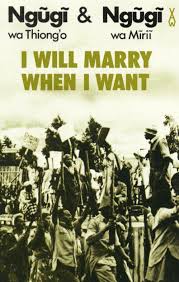 At the heart of Ngugi wa Thiong’o’s politics is denunciation of imperialism of any kind; political, economic, or cultural. Ngugi wa Thiong’o hungers for the day when all will express themselves in their own African tongues. Language, he argues, is the key to unlocking years of having been made to forget oneself. Part of that necessity to remember makes Ngugi wa Thiong’o to create works like The Trial of Dedan Kimathi that present heroes reclaiming what is rightfully theirs from the imperialists. Matigari is yet another novel that stirs up historical debates, questioning where the Mau Mau ‘heroes’ disappeared to. If they rose from the dead, would they be proud of having stamped out colonialism or would they be shocked that the colonialist came back in another form; neocolonialism in black skin?
At the heart of Ngugi wa Thiong’o’s politics is denunciation of imperialism of any kind; political, economic, or cultural. Ngugi wa Thiong’o hungers for the day when all will express themselves in their own African tongues. Language, he argues, is the key to unlocking years of having been made to forget oneself. Part of that necessity to remember makes Ngugi wa Thiong’o to create works like The Trial of Dedan Kimathi that present heroes reclaiming what is rightfully theirs from the imperialists. Matigari is yet another novel that stirs up historical debates, questioning where the Mau Mau ‘heroes’ disappeared to. If they rose from the dead, would they be proud of having stamped out colonialism or would they be shocked that the colonialist came back in another form; neocolonialism in black skin?
The kind of existential questions posed by Ngugi wa Thiong]o are not merely those that border on the absurd but those that prod the meaning of being continuously dispossessed. What does it mean to be poor? What does it mean to have your means of production confiscated ‘for your own good?’
Secret Lives, that collection of short stories by Ngugi wa Thiong’o is replete with characters haunted by the idea of dispossession at the time of the State of Emergency in British colonial Kenya (1952-1956) so much so that they are suspended between being true to themselves and therefore dying hungry, or siding with the colonialists if only for a morsel for existence’s sake.
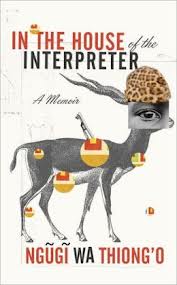 One can liken Ngugi wa Thiong’o’s works to that unforgettable three word line, This Is Africa, by the character Danny Archer in Blood Diamond, a war thriller set in Sierra Leone, directed in 2006 by Edward Zwick and starring Leonardo DiCaprio, Jennifer Connelly and Djimon Hounsou. Africa is here likened to a space where everyone has to fight for his piece and peace if only to survive.
One can liken Ngugi wa Thiong’o’s works to that unforgettable three word line, This Is Africa, by the character Danny Archer in Blood Diamond, a war thriller set in Sierra Leone, directed in 2006 by Edward Zwick and starring Leonardo DiCaprio, Jennifer Connelly and Djimon Hounsou. Africa is here likened to a space where everyone has to fight for his piece and peace if only to survive.
Ngugi wa Thiong’o appears to be obsessed with the idea of presenting the peasant as one capable of taking up a fight to repossess at least a modicum of dignity when he unites with other peasants. Of course this is a rehearsal of Marxist ideas. Ngugi wa Thiong’o’s works, especially his plays like I Will Marry When I Want and Mother Sing for Me present characters that are attached to the soil. They want to share; they must redistribute wealth; and they want to have an equal footing in the acquisition of property. Their land is what gives them the satisfaction they can happily live with. Their masculinity is tied to the production in their pieces of land. The soil is the symbol of belonging and of being tied to a place, through history.
Do these issues carry enough weight for Ngugi wa Thiong’o to win the Nobel Prize for Literature?
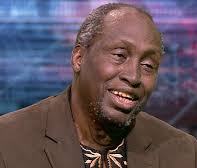 African writers that have won the Nobel Prize for Literature include Wole Soyinka, Naguib Mahfouz, Doris Lessing, JM Coetzee, and Albert Camus. These seem to have stoked enough controversy: Mahfouz’s issues of religion and identity with his Children of Gerbelawi, Soyinka with his political engagements as narrated in The Man Died and Doris Lessing’s classic, The Grass is Singing that so enrages readers on matters of race and gender. JM Coetzee never ceases to give bleakness as demonstrated, for example, in his Disgrace. Of course Albert Camus is the father of existentialism: seeking answers to our being. If controversy wins writers the award then Ngugi wa Thiong’o is in good company. He should win.
African writers that have won the Nobel Prize for Literature include Wole Soyinka, Naguib Mahfouz, Doris Lessing, JM Coetzee, and Albert Camus. These seem to have stoked enough controversy: Mahfouz’s issues of religion and identity with his Children of Gerbelawi, Soyinka with his political engagements as narrated in The Man Died and Doris Lessing’s classic, The Grass is Singing that so enrages readers on matters of race and gender. JM Coetzee never ceases to give bleakness as demonstrated, for example, in his Disgrace. Of course Albert Camus is the father of existentialism: seeking answers to our being. If controversy wins writers the award then Ngugi wa Thiong’o is in good company. He should win.
Some of Ngugi wa Thiong’o’s critics suggest that his call for a return to the use of indigenous language in writing is not practical. English has entrenched itself to the point where a return to “the source†will only send us backwards, they argue.
Ngugi wa Thiong’o’s suggestion for political emancipation still suggests aspects of socialism, even Marxism, as his 2006 novel, Murogi wa Kagogo that is translated as Wizard of the Crow, shows. How is Marxism relevant in the 21st century, Ngugi wa Thiong’o’s critics wonder.
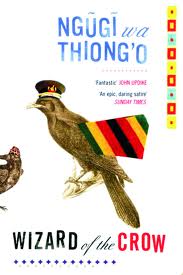 How come Ngugi wa Thiong’o, the self-styled advocate for ‘African ways’, detractors argue, remains ensconced in the comfort zone of capitalistic USA while continuing to dispense his anti-dote to African problems? They wonder why Prof Ngugi wa Thiong’o can’t join them at home, Africa, to fix the continent’s problems from the mother continent.
How come Ngugi wa Thiong’o, the self-styled advocate for ‘African ways’, detractors argue, remains ensconced in the comfort zone of capitalistic USA while continuing to dispense his anti-dote to African problems? They wonder why Prof Ngugi wa Thiong’o can’t join them at home, Africa, to fix the continent’s problems from the mother continent.
If Ngugi wa Thiong’o wins the Nobel Prize for Literature, it might be of significance to African writers who dream of someday achieving something. He could become a role model for writers. He could also help in stirring up a reading culture that should propel the sense of anger that his works bear against tyranny. Ngugi wa Thiong/o’s win, then, if it comes, shall be relevant and much more welcome!
Fred Mbogo, PhD, teaches Literature and Theatre at Moi University in Eldoret, Kenya.



